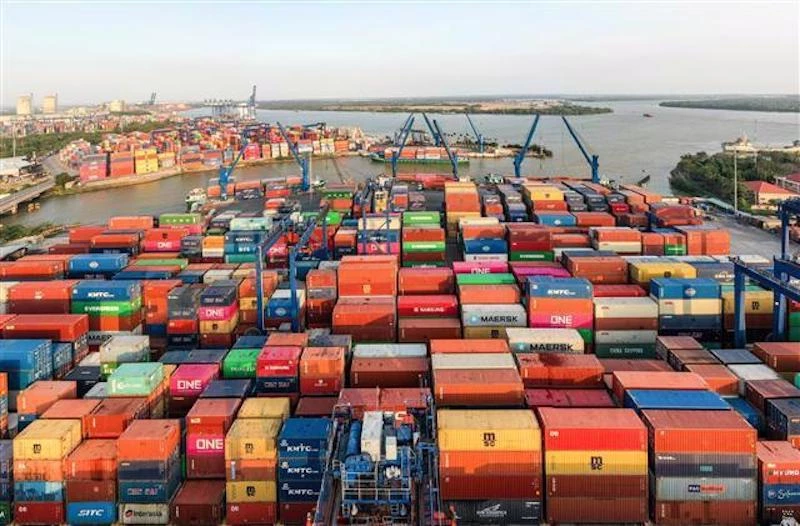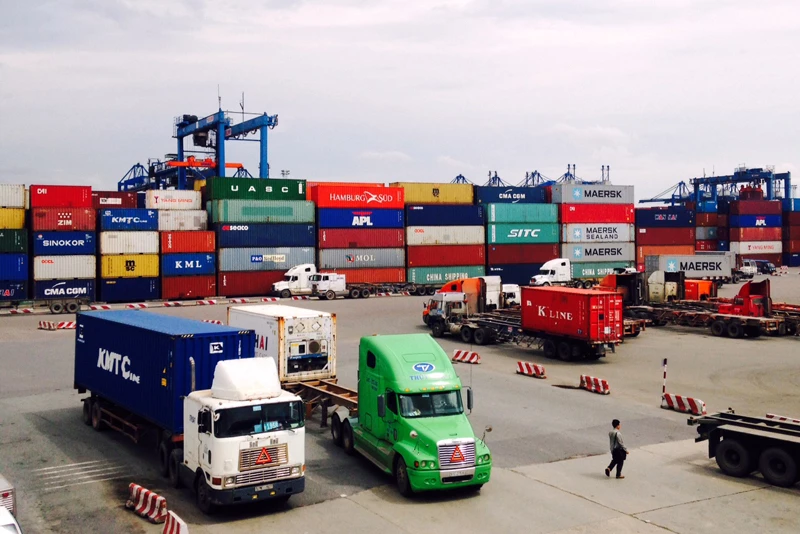


The role of policy advocacy by associations
Since April 1, 2022, after several delays, Ho Chi Minh City (HCMC) has decided to collect seaport infrastructure fees for import-export goods through the City's seaport according to Resolution No. 10/2020/NQ-HDND dated December 9, 2020, by the People's Council of HCMC, with the lowest fee being 15,000 dong per ton of cargo not packed in containers (goods declaring customs in HCMC); the highest fee is 4.4 million dong per 40-foot container (goods temporarily imported for re-export, stored in bonded warehouses, or transshipped).

Listening to sharing
According to the Department of Transport of HCMC, after two months of operating the seaport fee collection, more than 500 billion dong was collected. The Department of Transport of HCMC estimates that by 2025, the revenue from seaport infrastructure fees is expected to reach around 16,000 billion dong. This is a significant contribution, while businesses are struggling with daily operational difficulties that the government must address, including reducing taxes for businesses, as well as policies like the People's Council of Ha Tinh Province and Thanh Hoa Province supporting shipping companies opening container transport routes and entities transporting goods by containers through Vung Ang Port in Ha Tinh, Nghi Son Port in Thanh Hoa with a support amount of 200 million dong per port call (Resolution No. 276/2021-HDND dated April 28, 2021, of the People's Council of Ha Tinh Province; Resolution No. 166/2019/NQ-HDND dated April 4, 2019, of the People's Council of Thanh Hoa Province).
Before the fee collection period, upon learning that HCMC would collect seaport infrastructure fees, which would pose difficulties for the community of manufacturing, import-export, and logistics service providing businesses amidst the strong impact of the Covid-19 pandemic, industry associations, including the Vietnam Logistics Business Association (VLA), actively sought opinions from their member businesses and submitted documents to the City requesting the abolition or postponement of fee collection to a suitable time.
On December 10, 2021, the Vietnam Inland Waterways Administration (VIWA) chaired an online workshop with the participation of relevant associations and some inland waterway transport companies. The workshop discussed unreasonable fee collection for goods transported via inland waterways through the Hai Phong port area and the HCMC port area in the near future.
Following that event and the official fee collection by HCMC, in line with the previous recommendations, to protect the interests of logistics service businesses and manufacturing, import-export companies - partners of logistics service companies, VLA took the initiative to coordinate with 5 related industry associations: the Vietnam Ship Agents and Brokers Association (VISABA), the Vietnam Shippers' Council (VSC), the Vietnam Shipowners' Association (VSA), the Vietnam Seaport Association (VSA), and the Vietnam Inland Waterway Transport Association to submit a series of recommendations to HCMC regarding seaport infrastructure fee collection to the People's Committee, People's Council of Ho Chi Minh City, and relevant state management agencies under the judiciary and legislature, including Deputy Prime Minister Le Van Thanh, National Assembly Chairman Vuong Dinh Hue.
The recommendations of the associations representing businesses received strong support from the Ministry of Finance, Ministry of Transport, Finance Committee, Budget Committee of the National Assembly, and National Assembly delegate Le Thanh Van (Standing Member of this Committee), Private Economic Development Research Committee (Committee IV) of the Government Office, while also informing the mass media and public opinion to garner strong supportive voices.
On May 30, 2022, Deputy Prime Minister Le Minh Khai chaired a conference involving relevant parties and reached a conclusion for Ho Chi Minh City to consider and resolve this pressing issue appropriately. Based on the Deputy Prime Minister's conclusion, on June 8, 2022, the Government Office issued Official Letter No. 169/TB-VPCP announcing the conclusion "requesting the People's Committee of Ho Chi Minh City to promptly submit for consideration and adjustment by the City People's Council in July 2022."
By the end of June 2022, there were 30 related documents from the Finance and Budget Committee of the National Assembly (2 documents), the Government Office, National Assembly Delegate Le Thanh Van, the Ministry of Finance (5 documents), the Ministry of Transport (3 documents), the Vietnam Inland Waterways Department (5 documents), and various Associations (10 documents). These documents were analyzed logically and legally based on current laws.
With persistent and continuous efforts for the rights of the business community, there have been encouraging initial results. Accordingly, following the People's Committee's proposal, the People's Council of Ho Chi Minh City passed Resolution/Decision on July 7, 2022, regarding the Amendment and Supplement of Clause 1, Clause 2, Article 1 of Resolution No. 10/2020/NQ-HDND dated December 9, 2022, of the City People's Council on the issuance of fee rates for the use of infrastructure, structures, service facilities, and public utilities at border gates, seaports within the area of Ho Chi Minh City. The new fee rates took effect from August 1, 2022.
According to the calculations of the Ho Chi Minh City Department of Transport, reducing port infrastructure fees by 50% for waterway transport and adjusting fees for goods declaration in other localities will result in a reduction of 891 billion VND per year for the city. However, adjusting port infrastructure fees is necessary to gain the consensus of businesses, contribute to reducing logistics costs, promote the development of waterway transport, share the burden of transporting goods by road, and develop multimodal transport.

Key Takeaways:
From the successful implementation of this policy advocacy work, we can draw lessons for future activities of professional associations as follows:
Firstly, when complex issues involving multiple parties arise, associations should make timely decisions to reflect members' opinions and protect their legitimate rights. Pursue the matter persistently and proceed methodically with the principle of "step-by-step implementation," cleverly addressing each issue without being overly ambitious.
Secondly, associations should proactively pool their strengths. One association should take on a leading role, guiding with high responsibility. Each association should assign a capable focal point, responsible to the association and capable of fostering connections.
Thirdly, association leaders should participate with firm opinions, responding promptly to meet time requirements.
Fourthly, when coordinating multiple relevant parties with offices across the country, maximize the use of electronic means to send electronic documents and swiftly dispatch original copies to meet timely resolution demands, combined with consensus and signatures from multiple parties. The document sending process should be flexible and ensure timeliness.
Fifthly, the presented requirements should adhere to legal regulations, avoiding vague statements and providing specific evidence. Documents should be sent to the appropriate authorities for resolution, including legal, executive, and legislative bodies, to review whether the issued documents comply with legal provisions.
Sixthly, closely monitor the results after sending the documents to react promptly.
Seventhly, combine legal knowledge with the expertise of professionals and relevant management agencies. Proposals should be logical, empathetic, and written appropriately for the situation, demonstrating respect and courtesy.
Eighthly, utilize supportive communication channels to have practical effects on the proposed agency and gain understanding and support from the public.
Ninthly, after concluding the matter, express gratitude to the collaborating agencies and units, especially those that were recommended by the associations, acknowledging their responsive and beneficial modifications for the common good. Communicate this widely through media outlets.
Tenthly, in cases where issues remain unresolved or inadequately addressed, avoid hasty re-proposals and instead calmly assess the overall suggestions and provide answers for further opinions at an appropriate time.
Source: Business Forum


